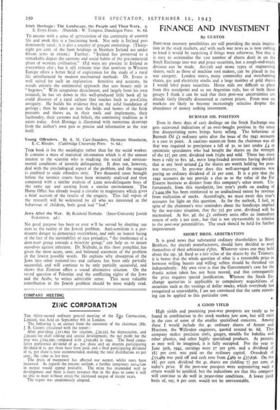FINANCE AND INVESTMENT
By CUSTOS
POST-WAR recovery possibilities are still providing the main inspira- tion in the stock markets, and with such war news as is now coming to hand it would be surprising if things were otherwise. Not that it is easy to sectionalise the vast number of shares dealt in on the Stock Exchange into war and peace securities, but a rough-and-ready division can be made. Aircraft and many types of engineering shares, such as those of machine tool makers, can be placed in the war category. London stores, many commodity and merchanting shares, gas and electricity stocks and a large number of gold shares I would label peace securities. Home rails are difficult to place from this standpoint and so are Argentine rails, but of both these groups I think it can be said that their post-war uncertainties are already fairly liberally discounted at .current prices. From now on markets are likely to become increasingly selective despite the abundance of money seeking investment.
BURMAH OIL POSITION Even in these days of cash dealings on the Stock Exchange one gets occasional indications of an over-bought position in the sense that disappointing news brings hasty selling. The behaviour of Burmah Oil £x ordinary units after the issue of the 1942 accounts is a case in point. A cautious statement from the chairman was all that was required to precipitate a fall of 5s. to just under £4 as optimistic speculators who had bought the shares on the strength of the 12+ per cent. dividend took fright and sold. There has since been a rally to 81s. 3d., more long-headed investors having decided that at any level around £4 the shares are worth holding for post- war recovery. In pre-war days this well-managed concern was paying an ordinary dividend of 21 per cent. It is a pity that the 1942 accounts do not provide a clue as to the value of the Far Eastern business as distinct from this company's other assets. Un- fortunately, from this standpoint, last year's profit on trading of (3,444,389 has been reinforced to an undisclosed extent by revenue from realisation of stocks. Accordingly, we must await this year's accounts for light on this question. As for the outlook, I feel, in spite of the chairman's wise reminders about the handicaps implied by the war-time situation, that the 122 per cent. dividend will be maintained. At 8xs. 3d. the £x ordinary units offer an immediate return of only 3 per cent., but that is not ut reasonable in relation to the post-war potentialities. The stock should be held for further improvement SHORT BROS. ARBITRATION It is good news that substantial ordinary shareholders in Short Brothers, the aircraft manufacturers, should have decided to avail themselves of their arbitration r‘ghts. Whatever views one may hold about the 29s. 3d. fixed as a fair value of the shares by the Treasury, it is better that the whole question of what is a reasonable price as between willing buyers and willing sellers should be thrashed out independently. My own view is that the Government's case for the drastic action taken has not been Droved, and that consequently the price requires special justification. Whereas the Stock Ex- change quotation is applicable to compulsory acquisitions of securities such as the vestings of dollar stocks, which everybody has recognised as unavoidable, I am not convinced that the same reason- ing can be applied to this particular case.
A GOOD YIELD
- High yields and promising post-war prospects are rarely to be found in combination in the stock markets just now, but still exist in the case of some of the smaller specialised concerns. Among these I would include the 4s. ordinary shares of Arnott and Harrison, the Willesden engineers, quoted around 9s. 6d. This company makes precision tools, gauges, moulds for bakelite and other plastics, and other highly specialised products. At present, as may well be imagined, it is fully occupied. For the year to June 30th, 1942, earnings were 27 per cent. and a dividend of 181 per cent. was paid on the ordinary capital. Overdraft of £559 was paid off and cash rose from £469 to L57,636. On the 181 per cent, dividend the 4s. shares are yielding 7+ per cent. at today's price. If the post-war prospect were unpromising such a return would be justified, but the indications are that this company will -continue to do well in peace-time conditions. A lower yield basis of, say, 6 per cent. would not be unreasonable. •


























 Previous page
Previous page